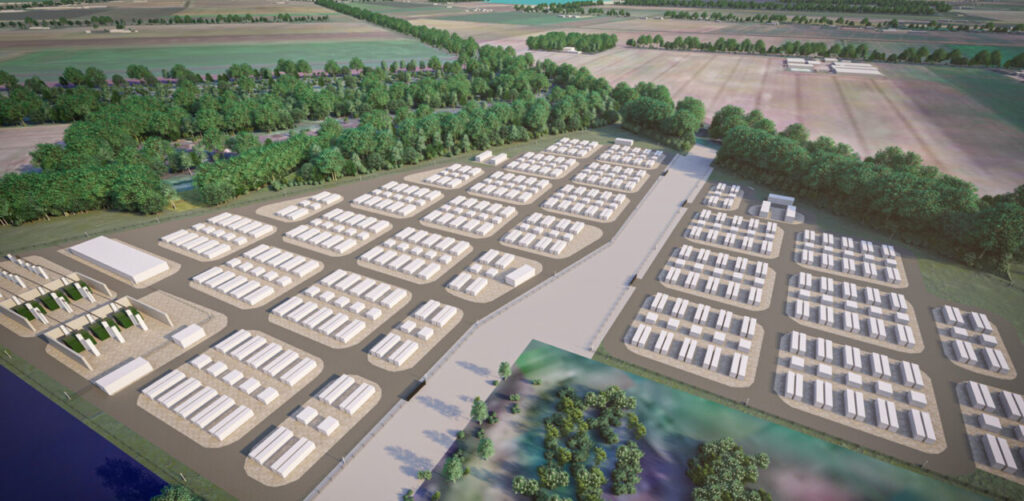
Developer LC energy has won an irrevocable permit for a 500MW/2,000MWh battery energy storage system (BESS) in Groningen, the Netherlands, one of the largest projects in the country to do so.
The BESS Musselkanaal project will connect to the 380kV grid via a new TenneT (the transmission system operator) substation and construction is scheduled to begin in the first half of 2026, with connection to the grid in the first half of 2027, LC Energy’s project developer Thomas van den Brand said.
Enjoy 12 months of exclusive analysis
- Regular insight and analysis of the industry’s biggest developments
- In-depth interviews with the industry’s leading figures
- Annual digital subscription to the PV Tech Power journal
- Discounts on Solar Media’s portfolio of events, in-person and virtual
LC Energy is a joint venture between developers Low Carbon (UK) and QING (Netherlands), and its managing director Friso Huizinga, head of project management Georg van den Berg and van den Brand discussed it and the Dutch market with Energy-Storage.news.
Largest permitted BESS in the Netherlands
Musselkanaal is at the Zuid-Groningen industrial park in the Groningen province and is the largest BESS in the Netherlands to reach the permitted milestone, LC Energy said (1.2GWh and 1.5GWh projects from Giga Storage and Lion Storage may have previously held the title).
LC Energy is in the process of financing and land surveys, preparing civil works and procurement, and hope to conclude that by the end of this year, Huizinga said. The land and project need some additional works to go ahead, which va den Berg explained.
“The land for the project site has been inundated as it was used for storing waste water from a potato processing factory, so we need to use piles to stabilise the land. But land, grid and permit are secured which is the important part. The project needs a new high-voltage transformer to step down the power from 380kV to 33kV,” he said.
Van den Brand said the company is “exploring opportunities to participate in plans for an energy hub and emergency power supply”. LC Energy is a developer of solar PV and BESS in the Netherlands and is targeting 1.5GW of BESS before 2030.
Uptick in large-scale projects
The flurry of large-scale projects progressing recently in the Netherlands – LC Energy, Giga Storage, Lion Storage and also one from SemperPower and Corre Energy – is a “slight coincidence”, driven mainly by development timelines, van den Berg said, though grid fee reforms and BESS capex falls have helped too.
“The last 12 months has seen important transport tariff reforms by the ACM, which have meant a 65% discount in the grid fees. Without these reforms, no large-scale project could reach financial close,” Huizinga added.
“This certainly is a big step into the right direction, however this is not enough. There is a big increase in transport tariffs forecasted in the coming years. Further reforms will be required to come to the desired capacity of 9GW in the Netherlands in 2030.”
Developing large-scale BESS in the Netherlands
The reform to grid transport fees helped with one of the biggest challenges in the market, but developing projects in the densely populated country is still a big challenge with every square metre fought over. Developing large-scale projects on agricultural land is basically on hold, Huizinga said, and BESS Musselkanaal’s location on industrial land allowed it to progress with planning.
Huizinga: “What happened was you had this big wave of wind development, then a big wave of solar development, and now BESS is a third wave. Solar is already banned on agricultural land and BESS has basically been included in that ban. The government sees the need for National coordination of this critical infrastructure and is reforming things to allow for projects on agricultural land. This policy will hopefully be concluded later this year, and municipalities would then follow next year with their own policies.”
Van den Berg agreed, saying that recent years has seen a political shift in the Netherlands where farming is now the most important topic and “everything else is put to the side”, and Groningen, where Musselkanaal is located, has seen this shift on the local level.
“It’s a challenge because projects ideally need to be as close as possible to substations and those are often in the countryside,” he added.
Just this week, Germany-headquartered utility and independent power producer (IPP) RWE announced plans to build 7.5MW/11MWh ‘grid-forming’, inertia-capable BESS system in the Netherlands. Last month, Giga Storage claimed the first conclusion of a time-limited grid contract for BESS under the aforementioned ACM reforms.

